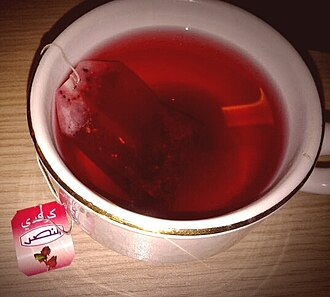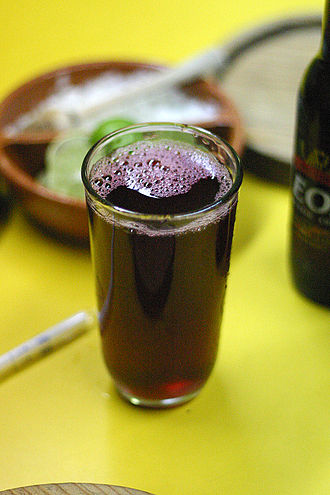Hibiscus tea is a herbal tea made as an infusion from crimson or deep magenta-colored calyces (sepals) of the roselle (Hibiscus sabdariffa) flower. It is consumed both hot and cold and has a tart, cranberry-like flavor.
Consumption: Africa
The roselle hibiscus used to make the tea likely originated in Africa.[1] In Africa, hibiscus tea is commonly sold in markets and the dried flowers can be found throughout West and East Africa. Variations on the drink are popular in West Africa and parts of Central Africa. In Senegal, bissap is known as the "national drink of Senegal". Hibiscus tea is often flavored with mint or ginger in West Africa. In Ghana it is known as "sobolo", and "zobo" in Nigeria.
Karkadé (Arabic: كَركَديه karkadīh pronounced [kɑrkæˈdiːh]) is served hot or chilled with ice. It is consumed in some parts of North Africa, especially in Egypt and Sudan

Consumption: Americas
Agua de flor de Jamaica, also called agua de Jamaica and rosa de Jamaica, is popular in Mexico, Central America, and parts of South America and the Caribbean. It is one of several common aguas frescas, which are inexpensive beverages typically made from fresh juices or extracts. Jamaica and other aguas frescas are commonly found in taquerias or other Mexican restaurants. It is usually prepared by steeping the calyces in boiling water, straining the mixture, pressing the calyces (to squeeze all the juice out), adding sugar, and stirring. It is served chilled, and in Jamaica, this drink is a tradition at Christmas, served with fruitcake or sweet potato pudding

In Panama, both the flowers and the drink are called saril (a derivative of the English word sorrel). It is prepared by picking and boiling the calyces with chopped ginger, sugar, clove, cinnamon, and nutmeg. It is traditionally drunk around Christmas and Chinese New Year. This diverges from Mexico and Central America and is much more in line with the Caribbean, due to the strong West Indian influence in Panamanian culture; especially in Panama City and most of Panama's Caribbean coast.
In the English-speaking Caribbean, the drink, called sorrel, is made from the calyces, and it is considered an integral part of Christmas celebrations. In American soul food cuisine, hibiscus tea is included in a category of "red drinks" associated with West Africa.
Consumption: Southeast Asia
In Thailand, most commonly, roselle is prepared as a cold beverage, heavily sweetened and poured over ice, similar to sweetened fruit juices. Plastic bags filled with ice and sweetened 'grajeab' can be found outside most schools and in local markets. It is less commonly made into a wine.
Reviews have concluded that hibiscus tea consumption appears to modestly lower blood pressure in people with high blood pressure. Hibiscus tea was generally well tolerated, and did not adversely affect liver or kidney function at lower doses, but may be hepatotoxic at high doses.
Hexbear links
- 🐻Link to all Hexbear comms
- 📀 Come listen to music and Watch movies with your fellow Hexbears nerd, in Cy.tube
- 🔥 Read and talk about a current topics in the News Megathread
- ⚔ Come talk in the New Weekly PoC thread
- ✨ Talk with fellow Trans comrades in the New Weekly Trans thread
- 👊 Share your gains and goals with your comrades in the New Weekly Improvement thread
- 🧡 Disabled comm megathread
reminders:
- 💚 You nerds can join specific comms to see posts about all sorts of topics
- 💙 Hexbear’s algorithm prioritizes comments over upbears
- 💜 Sorting by new you nerd
- 🌈 If you ever want to make your own megathread, you can reserve a spot here nerd
- 🐶 Join the unofficial Hexbear-adjacent Mastodon instance toots.matapacos.dog
Links To Resources (Aid and Theory):
Aid:
Theory:


Using Rednote feels like a dream of a better world. All these western users are flooding into a Chinese app and talking with Chinese people for the first time on such a scale, and not only are the Chinese users mostly welcoming and excited about it, the western users are actually respectful as well. A lot of westerners seem to be interested in learning about China and Chinese now from a genuine human perspective, as a nation of history and culture, not just seeing it as an enemy nation filled with enemy people. Chinese language lessons seem to be very popular and in just a few minutes I've seen the most basic of cultural exchange - that being Americans learning that Chinese people have better healthcare than them lol.
Yes, I know its probably correct to be cynical here. TikTok is being banned for being a dangerous tool of propaganda used by the left, there's no way a Chinese platform dominated with Chinese users will be allowed to exist for long. But it is still a very nice thing to see. It looks like a few Americans will realise how brainwashed they have been towards China, and that alone is a positive to come from this.
Oh good lord this app also has extremely handsome men cooking food